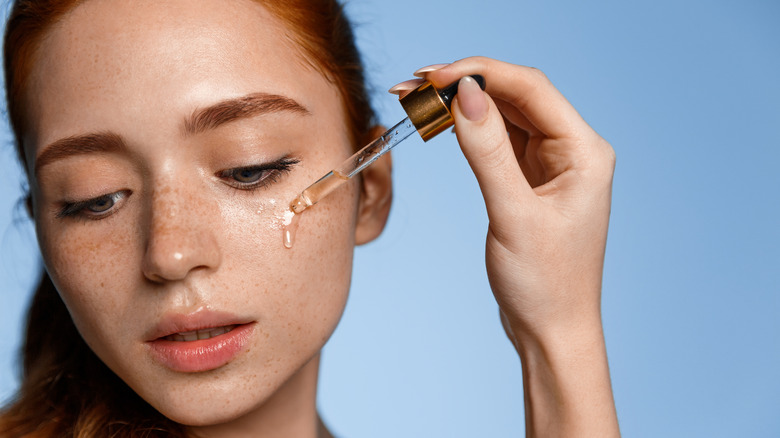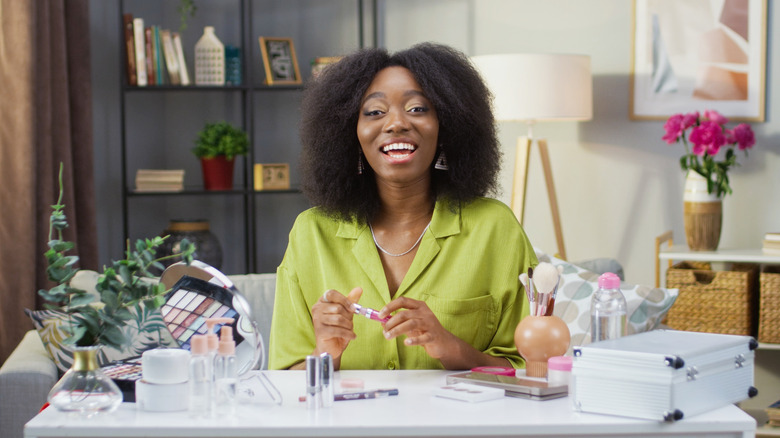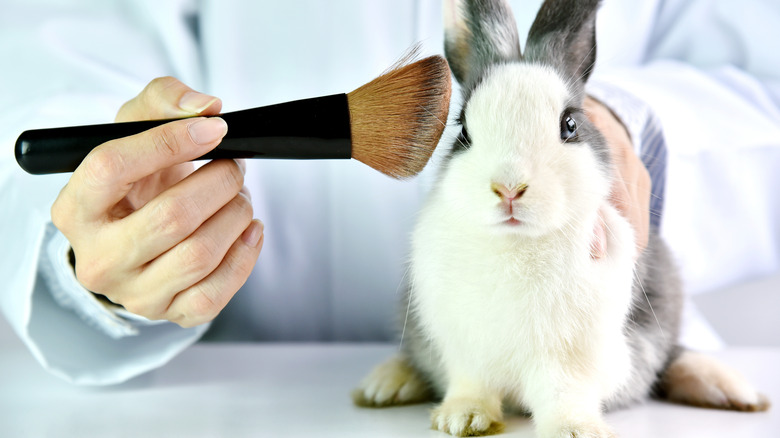Why You Should Think Twice Before Buying From A Celebrity-Owned Skincare Brand
We may receive a commission on purchases made from links.
It seems like every celeb these days is launching a new skincare line: from Kim Kardashian's SKKN by Kim, Rhode by Hailey Bieber, to our reader's favorite, The Outset but Scarlett Johansson. Although it may be tempting to try and achieve the glowing skin of a celebrity, we think you should think twice before you fall for the hype. There are plenty of other skincare products that offer the same results while also making a real difference in our world.
The celeb-owned skincare and beauty market is already crowded, making us question if the intentions are authentic or just a money grab. On the other hand, small businesses are typically created by passionate entrepreneurs looking to do good and fill a specific need in their industry. Take female-owned vegan skincare line Mahina Beaute, who began looking for a vegan alternative to hyaluronic acid. After discovering that the popular ingredient is typically made from animal byproducts like cow hooves, they agreed they needed to create a cleaner and cruelty-free alternative for their vegan community.
Your choices can even go beyond the benefits of supporting small businesses. The beauty products you purchase can also contribute to the growth of your community, the economy, and can even fight systemic racism and sexism. This is your sign to look outside of what's trending on TikTok and consider the bigger picture. Here are three reasons to think twice before buying from a celebrity-owned skincare brand.
Shop female-owned beauty brands
Gender disparity in the workplace is incredibly significant in 2022, even in beauty — an industry that caters mainly to women. The statistics WWD found are shocking: out of the 100 largest beauty companies, only 10 had a female CEO. No wonder women are escaping the corporate world and starting their own small beauty businesses.
These appalling statistics certainly aren't due to women being unqualified for top-tier positions because females are graduating college at a higher rate than men. Plus, they clearly have the experience and insight to make a skincare company successful. The founder of beauty brand Pinch of Colour, Linda Treska, told Glamour, "I will say that women will have a much stronger point of view when it comes to formulas or packaging because we're the consumers. It ultimately comes down to the consumers — what they experience and how they'll respond — so women do have an advantage; we use these products every day."
Some female-owned beauty brands that should be on your radar include Kulfi (which is also a South Asian-owned brand), Tower 28, and Kosas.
Support BIPOC-owned businesses
When you support a BIPOC-owned business, not only do you support the individual, but you also uplift their families and their communities. Due to hundreds of years of systemic racism, people of color (especially women) continue to have higher unemployment and poverty rates. According to the American Bar Association, the poverty rate of African American women falls at 21.4%, 18.7% for Hispanic women, and 22% for Indigenous women, all of which are higher than the U.S. average of 12.7%.
Minority-owned brands aren't commonly found on the shelves of major retailers, making it a challenge to support them on a typical outing. But one way to fight against flawed national and corporate systems is by purchasing intentionally from small BIPOC-owned businesses. This may take some extra research online or by shopping at stores committed to stocking 15% of their shelves with Black-owned brands through the Fifteen Percent Pledge.
One BIPOC-owned skincare brand that gives back is Katini Skin, an eco-luxe line of skin oils by Katini Yamaoka. Beyond its sustainable packaging and ethical ingredients, 20% of Katini Skin's sales go to Black Progress Matters, an organization with a mission to change the face and color of leadership in executive positions across America.
Consider the environmental impact and the well being of animals
Sustainable packaging, clean formulas, and ethical practices aren't always at the forefront of celebrity-owned skincare brands. However, plenty of small businesses check every eco-friendly box without compromising on quality.
Take long-time beauty execs Emmanuel Rey and Suzanne Dawson, who left the corporate beauty world to create a company that focuses on placing sustainability above profitability. YUNI Beauty replaces the basic wasteful cleansing wipe with a toxin-free biodegradable version. The company also has a collection of cruelty-free skincare goodies composed of organic, fair trade, and vegan ingredients, all manufactured in a solar-powered plant.
Excess plastic and harmful chemicals from beauty products end up in our oceans, contributing to the fact that there will be more plastic than fish in our waters by the year 2050 (via TRVST). California-based conscious skincare brand OSEA was created out of the urgency to protect and respect our oceans. The glass packaging holds bioavailable and sustainably harvested seaweed creams and serums that give skin a healthy glow. OSEA is a verified Ocean Positive company, which means that they offset more carbon than the emissions they create by contributing to coastal restoration projects across the world.
So the next time a celeb influences you to click on their newest product, take a deeper look into their company ethos — chances are there's a better business out there that's actually making a difference in the world.



